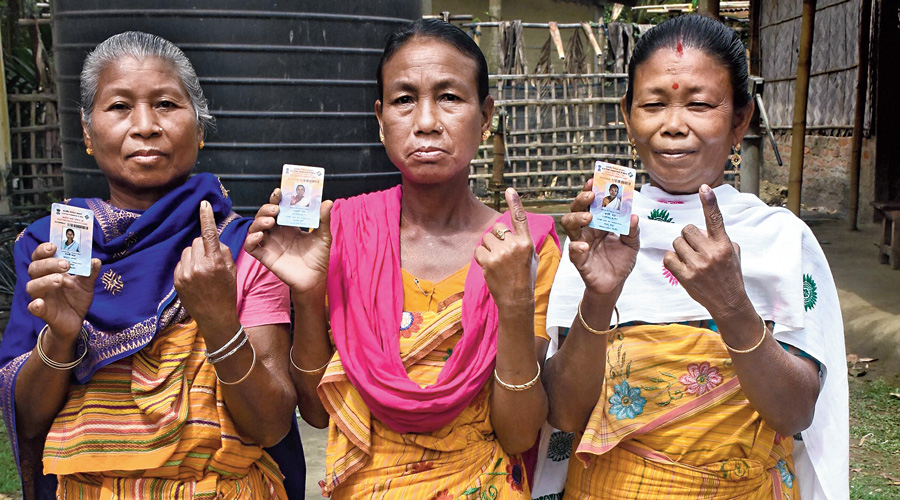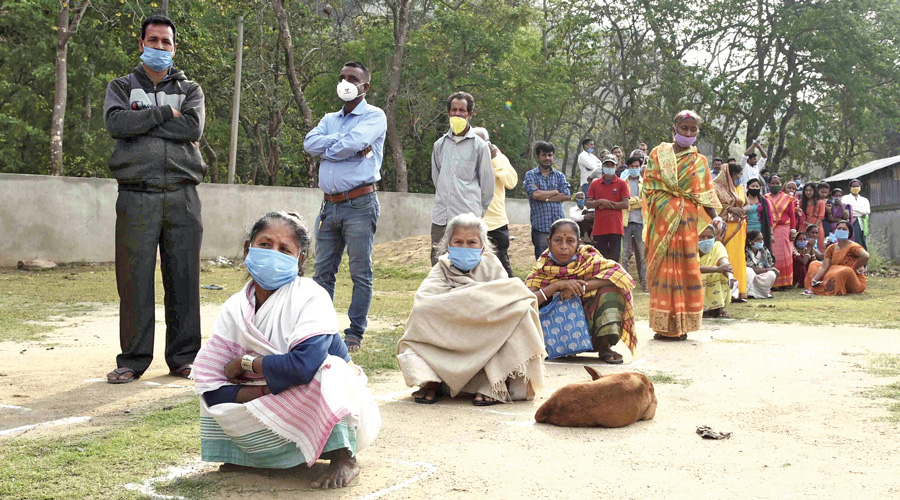The second phase of the Assam Assembly polls held in 39 constituencies on Thursday was marked by brief stoppages in a few polling stations in Silchar and Nagaon owing to malfunctioning electronic voting machines (EVMs) and police firing to disperse a group of protesters in Sonai constituency of Cachar district which left three injured.
The voter turnout was over 77 per cent.
Sources said the trouble in Sonai was triggered by an argument between a polling official and a youth who had come to vote. This led to a protest which flared up with the arrival of the Sonai BJP candidate Aminul Hoque Laskar, who is also the deputy Speaker of the state Assembly, eventually leading to the firing incident late in the afternoon.
An election department official here confirmed the firing incident but details about what actually happened are awaited. Security has been tightened in the area.
The Met office here had warned of rainfall at most places with heavy to very heavy rain at isolated places in Assam and adjoining Meghalaya because of strong lower-level south-westerlies. However, in a relief to political parties and polling personnel, the day passed off without major hiccups.
“There was rainfall in a few places in the hill districts, Morigaon and Mangoldoi but had no impact as such. EVMs too were replaced from wherever it was reported that they were malfunctioning. There was also a firing incident in Sonai but overall the day passed off smoothly,” an official said.

Tribal community women show their fingers after casting their votes at Sildubi in Morigaon district on Thursday. PTI photo
Polling was held in 15 constituencies in Barak Valley and five in the two hill districts of Dima Hasao and Karbi Anglong, among others, to decide the fate of 365 candidates in 13 districts. The remaining constituencies are in central and lower Assam.
The first phase covering 47 of the 126 constituencies spread over 12 districts was held on March 27, which registered a turnout of 79.97 per cent.
Like in the first phase, the four-party alliance led by the ruling BJP continued its attack on the AIUDF and its chief Badruddin Ajmal, highlighting its beneficiary schemes, especially those targeting women, students and job-seekers in the run-up to the second phase. The attack is continuing with the same narrative built around influx, development and identity for the third phase polls on April 6 evident from Prime Minister Narendra Modi’s election rally in Kokrajhar on Thursday.
Addressing a rally for BJP’s alliance partner United People’s Party Liberal in Kokrajhar, Modi used a football term to attack the Congress and the AIUDF, part of the 10-party Opposition grand alliance. “People have shown them (Congress and AIUDF) the red card... They trust the NDA. During Congress’s regime, Assam experienced bombs, bandooks (guns) and blockades. The NDA has brought peace,” Modi said.
The Congress-led alliance too has stuck to its five guarantees to woo the voters, harping on job creation, opposition to the Citizenship Amendment Act and hike in the daily wage of tea garden workers, who play a significant role in Barak Valley, to Rs 365.
Congress leader Rahul Gandhi has accused the BJP of attacking the identity, culture and language of Assam through the imposition of the contentious CAA. On Tuesday, he promised to enact Article 244 (A) for the constitution of a state within a state, a long-pending demand of the two hill districts.
State BJP ministers Parimal Suklabaidya (Dhalai), Bhabesh Kalita (Rangia) and Pijush Hazarika (Jagiroad), former Assam Sahitya Sabha president Paramananda Rajbongshi (Sipajhar), Ajmal’s brother Sirajuddin, are among the prominent candidates in the fray in the second phase.
In 2016, the AGP-BJP-BPF combine had won 86 of the 126 seats with a vote share of 41.9 per cent, followed by the then ruling Congress — 26 seats and 31 per cent vote share. The AIUDF, fighting separately, bagged 13 seats with a 13 per cent vote share. The BPF and the AIUDF are with the Congress-led alliance this time round, making the contest a difficult one to call.










